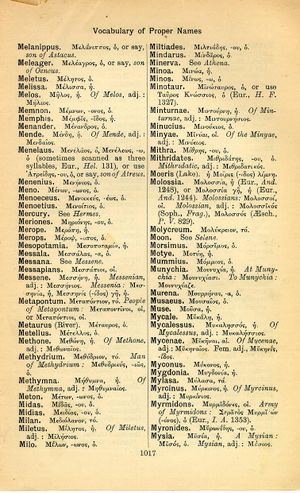Memphis
λύχνον μεθ᾿ ἡμέραν ἅψας περιῄει λέγων “ἄνθρωπον ζητῶ” → He lit a lamp in broad daylight and said, as he went about, “I am looking for a human”
English > Greek (Woodhouse)
Μέμφις, -ιδος, ἡ.
Latin > English (Lewis & Short)
Memphis: is and ĭdos, f., = Μεμφις,
I a city of Middle Egypt, celebrated as the residence of the Egyptian kings, now Metrahenny (fourteen miles south of Cairo), Mel. 1, 9, 9; Plin. 2, 85, 87, § 201; 5, 9, 9, § 50; Liv. 45, 11 sq.; Hor. C. 3, 26, 10; Tac. H. 4, 84; Prop. 3, 11, 34: quae colis, et Memphin, palmiferamque Pharon, Ov. Am. 2, 13, 7.— Hence,
A Memphītes, ae, m. adj., Memphite, of or from the city of Memphis, Egyptian: Memphiten plangere bovem, i. e. Apis, Tib. 1, 8 (7), 28 lapis, Plin. 36, 7, 11, § 56.—
B Memphītĭcus, a, um, adj., Memphitic, Egyptian: templa, Ov. A. A. 1, 77: ensis, Luc. 10, 5.—
C Memphītis, ĭdis, f. adj., Memphite, Egyptian (poet.): terrā Memphitide, Juv. 15, 122: vacca, i. e. Io, Ov. A. A. 3, 393: cymba, Luc. 4, 136.
Latin > French (Gaffiot 2016)
Memphis,¹³ is, f. (Μέμφις), capitale de l’Égypte : Liv. 45, 11 ; Plin. 5, 50 ; Mela 1, 60 ; Hor. O. 3, 26, 10 || -ītēs, æ, adj. m., de Memphis : Tib. 1, 8, 28 ; Plin. 36, 56, ou -ītĭcus, a, um, Ov. Ars 1, 77 ; Luc. 10, 6, ou -ītis, ĭdis, f., Juv. 15, 122 ; Ov. Ars 3, 193 ; Luc. 4, 136.

